|
|
|
Sort Order |
|
|
|
Items / Page
|
|
|
|
|
|
|
| Srl | Item |
| 1 |
ID:
162663


|
|
|
|
|
| Summary/Abstract |
The behavioral sciences are playing an increasingly important role in the design and implementation of public policy worldwide. While there have been several important critiques of the latest policy revolution linking the behavioral sciences and the state in the pursuit of human behavioral change, few scholars have investigated the potential costs of “nudging” for democratic citizenship and the deliberative capacities upon which democratic self-governance relies. A central purpose here is to consider the possible civic consequences of nudging within the pursuit of otherwise desirable social outcomes (like improved public health, energy conservation, or higher rates of financial saving). Through a critical investigation of the governing philosophy of the “nudging state” and drawing on the policy feedback literature, I argue that the recent behavioral turn in public policy risks overlooking or bypassing the personal capacities and institutional conditions necessary for the meaningful exercise of democratic citizenship. Evidence from the empirical assessment of deliberative democracy shows how liberal societies can fruitfully address bounded rationality while facilitating civic virtues like public practical reason without violating liberty or constraining pluralism.
|
|
|
|
|
|
|
|
|
|
|
|
|
|
|
|
| 2 |
ID:
162661
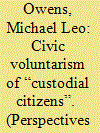

|
|
|
|
|
| Summary/Abstract |
A growing body of research explores the influence of involuntary criminal justice contact on political participation, demonstrating that all types of contact weaken political participation. We posit, however, that personal connections to civil society organizations (CSOs) moderate the negative effects of involuntary criminal justice contact on political participation, particularly political activism beyond registering to vote and voting. We test this proposition with individual-level and aggregate-level data from metropolitan and municipal Chicago. Our findings confirm a paradox of participation by custodial citizens. One, we demonstrate positive, statistically significant, and substantive effects of personal connections to CSOs on nonvoting political participation by custodial citizens. Two, the negative effects of involuntary criminal justice contact on voting participation among individuals and communities may endure, despite personal connections to CSOs, even in a state where the franchise is restored immediately after incarceration. Our study suggests that an associational account of political participation deepens our understanding of the political behavior of custodial citizens and their communities in the age of mass incarceration.
|
|
|
|
|
|
|
|
|
|
|
|
|
|
|
|
| 3 |
ID:
162665
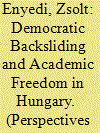

|
|
|
|
|
| Summary/Abstract |
The Hungarian government’s discriminatory actions against the Central European University constitute one of the most prominent conflicts between an academic institution and a government today. My contribution gives a detailed account of how the conflict has unfolded so far. Various frameworks of interpretation, including democratic backsliding, cultural war, and international politics are discussed. I place the story of the university in the context of the polarized cultural climate of Eastern Europe and draw attention to the power of universities in collaborating across borders in defense of academic freedom—and freedom in general.
|
|
|
|
|
|
|
|
|
|
|
|
|
|
|
|
| 4 |
ID:
162668


|
|
|
|
|
| Summary/Abstract |
Among the many scholarly attempts to reckon with the causes and consequences of Donald Trump’s rise, few have attracted popular attention on the scale of Steven Levitsky and Daniel Ziblatt’s How Democracies Die. Seldom do books by political scientists make it onto the New York Times best sellers list, but this one has, a testament to its broad influence. Levitsky and Ziblatt situate Trumpism within a broader comparative and historical context in order to assess its similarities to and differences from democratic breakdowns elsewhere, particularly in Europe and Latin America. Their broad argument is that modern slides into authoritarianism are not the result of revolutions or military coups, but rather the consequence of a steady erosion of political norms and the assault on such fundamental democratic institutions as an independent judiciary and a free press. In short, contemporary democracies die not as a result of men with guns attacking from outside the system, but rather because elected leaders from inside that system slowly undermine them. Judged from this standpoint, the authors argue that American democracy is now in real danger, and they offer a range of suggestions for saving it. How convincing is Levitsky and Ziblatt’s analysis of democratic breakdown, and how well does it apply to the American case? How useful are the solutions that they offer for rescuing American democracy? We have asked a range of prominent scholars from across the discipline to consider these questions in the present symposium.
|
|
|
|
|
|
|
|
|
|
|
|
|
|
|
|
| 5 |
ID:
162669


|
|
|
|
|
| Summary/Abstract |
Among the many scholarly attempts to reckon with the causes and consequences of Donald Trump’s rise, few have attracted popular attention on the scale of Steven Levitsky and Daniel Ziblatt’s How Democracies Die. Seldom do books by political scientists make it onto the New York Times best sellers list, but this one has, a testament to its broad influence. Levitsky and Ziblatt situate Trumpism within a broader comparative and historical context in order to assess its similarities to and differences from democratic breakdowns elsewhere, particularly in Europe and Latin America. Their broad argument is that modern slides into authoritarianism are not the result of revolutions or military coups, but rather the consequence of a steady erosion of political norms and the assault on such fundamental democratic institutions as an independent judiciary and a free press. In short, contemporary democracies die not as a result of men with guns attacking from outside the system, but rather because elected leaders from inside that system slowly undermine them. Judged from this standpoint, the authors argue that American democracy is now in real danger, and they offer a range of suggestions for saving it. How convincing is Levitsky and Ziblatt’s analysis of democratic breakdown, and how well does it apply to the American case? How useful are the solutions that they offer for rescuing American democracy? We have asked a range of prominent scholars from across the discipline to consider these questions in the present symposium.
|
|
|
|
|
|
|
|
|
|
|
|
|
|
|
|
| 6 |
ID:
162670


|
|
|
|
|
| Summary/Abstract |
Among the many scholarly attempts to reckon with the causes and consequences of Donald Trump’s rise, few have attracted popular attention on the scale of Steven Levitsky and Daniel Ziblatt’s How Democracies Die. Seldom do books by political scientists make it onto the New York Times best sellers list, but this one has, a testament to its broad influence. Levitsky and Ziblatt situate Trumpism within a broader comparative and historical context in order to assess its similarities to and differences from democratic breakdowns elsewhere, particularly in Europe and Latin America. Their broad argument is that modern slides into authoritarianism are not the result of revolutions or military coups, but rather the consequence of a steady erosion of political norms and the assault on such fundamental democratic institutions as an independent judiciary and a free press. In short, contemporary democracies die not as a result of men with guns attacking from outside the system, but rather because elected leaders from inside that system slowly undermine them. Judged from this standpoint, the authors argue that American democracy is now in real danger, and they offer a range of suggestions for saving it. How convincing is Levitsky and Ziblatt’s analysis of democratic breakdown, and how well does it apply to the American case? How useful are the solutions that they offer for rescuing American democracy? We have asked a range of prominent scholars from across the discipline to consider these questions in the present symposium.
|
|
|
|
|
|
|
|
|
|
|
|
|
|
|
|
| 7 |
ID:
162671


|
|
|
|
|
| Summary/Abstract |
Among the many scholarly attempts to reckon with the causes and consequences of Donald Trump’s rise, few have attracted popular attention on the scale of Steven Levitsky and Daniel Ziblatt’s How Democracies Die. Seldom do books by political scientists make it onto the New York Times best sellers list, but this one has, a testament to its broad influence. Levitsky and Ziblatt situate Trumpism within a broader comparative and historical context in order to assess its similarities to and differences from democratic breakdowns elsewhere, particularly in Europe and Latin America. Their broad argument is that modern slides into authoritarianism are not the result of revolutions or military coups, but rather the consequence of a steady erosion of political norms and the assault on such fundamental democratic institutions as an independent judiciary and a free press. In short, contemporary democracies die not as a result of men with guns attacking from outside the system, but rather because elected leaders from inside that system slowly undermine them. Judged from this standpoint, the authors argue that American democracy is now in real danger, and they offer a range of suggestions for saving it. How convincing is Levitsky and Ziblatt’s analysis of democratic breakdown, and how well does it apply to the American case? How useful are the solutions that they offer for rescuing American democracy? We have asked a range of prominent scholars from across the discipline to consider these questions in the present symposium.
|
|
|
|
|
|
|
|
|
|
|
|
|
|
|
|
| 8 |
ID:
162672


|
|
|
|
|
| Summary/Abstract |
Among the many scholarly attempts to reckon with the causes and consequences of Donald Trump’s rise, few have attracted popular attention on the scale of Steven Levitsky and Daniel Ziblatt’s How Democracies Die. Seldom do books by political scientists make it onto the New York Times best sellers list, but this one has, a testament to its broad influence. Levitsky and Ziblatt situate Trumpism within a broader comparative and historical context in order to assess its similarities to and differences from democratic breakdowns elsewhere, particularly in Europe and Latin America. Their broad argument is that modern slides into authoritarianism are not the result of revolutions or military coups, but rather the consequence of a steady erosion of political norms and the assault on such fundamental democratic institutions as an independent judiciary and a free press. In short, contemporary democracies die not as a result of men with guns attacking from outside the system, but rather because elected leaders from inside that system slowly undermine them. Judged from this standpoint, the authors argue that American democracy is now in real danger, and they offer a range of suggestions for saving it. How convincing is Levitsky and Ziblatt’s analysis of democratic breakdown, and how well does it apply to the American case? How useful are the solutions that they offer for rescuing American democracy? We have asked a range of prominent scholars from across the discipline to consider these questions in the present symposium.
|
|
|
|
|
|
|
|
|
|
|
|
|
|
|
|
| 9 |
ID:
162673


|
|
|
|
|
| Summary/Abstract |
Among the many scholarly attempts to reckon with the causes and consequences of Donald Trump’s rise, few have attracted popular attention on the scale of Steven Levitsky and Daniel Ziblatt’s How Democracies Die. Seldom do books by political scientists make it onto the New York Times best sellers list, but this one has, a testament to its broad influence. Levitsky and Ziblatt situate Trumpism within a broader comparative and historical context in order to assess its similarities to and differences from democratic breakdowns elsewhere, particularly in Europe and Latin America. Their broad argument is that modern slides into authoritarianism are not the result of revolutions or military coups, but rather the consequence of a steady erosion of political norms and the assault on such fundamental democratic institutions as an independent judiciary and a free press. In short, contemporary democracies die not as a result of men with guns attacking from outside the system, but rather because elected leaders from inside that system slowly undermine them. Judged from this standpoint, the authors argue that American democracy is now in real danger, and they offer a range of suggestions for saving it. How convincing is Levitsky and Ziblatt’s analysis of democratic breakdown, and how well does it apply to the American case? How useful are the solutions that they offer for rescuing American democracy? We have asked a range of prominent scholars from across the discipline to consider these questions in the present symposium.
|
|
|
|
|
|
|
|
|
|
|
|
|
|
|
|
| 10 |
ID:
162657


|
|
|
|
|
| Summary/Abstract |
Platform companies disrupt not only the economic sectors they enter, but also the regulatory regimes that govern those sectors. We examine Uber in the United States as a case of regulating this disruption in different arenas: cities, state legislatures, and judicial venues. We find that the politics of Uber regulation does not conform to existing models of regulation. We describe instead a pattern of “disruptive regulation”, characterized by a challenger-incumbent cleavage, in two steps. First, an existing regulatory regime is not deregulated but successfully disregarded by a new entrant. Second, the politics of subsequently regulating the challenger leads to a dual regulatory regime. In the case of Uber, disruptive regulation takes the form of challenger capture, an elite-driven pattern, in which the challenger has largely prevailed. It is further characterized by the surrogate representation of dispersed actors—customers and drivers—who do not have autonomous power and who rely instead on shifting alignments with the challenger and incumbent. In its surrogate capacity in city and state regulation, Uber has frequently mobilized large numbers of customers and drivers to lobby for policy outcomes that allow it to continue to provide service on terms it finds acceptable. Because drivers have reaped less advantage from these alignments, labor issues have been taken up in judicial venues, again primarily by surrogates (usually plaintiffs’ attorneys) but to date have not been successful.
|
|
|
|
|
|
|
|
|
|
|
|
|
|
|
|
| 11 |
ID:
162666


|
|
|
|
|
| Summary/Abstract |
Recent attempts to explain the development of medieval representative institutions have neglected a long-standing insight of medieval and legal historians: Political representation and rule by consent were first developed within the Catholic Church following the eleventh-century Gregorian Reforms and the subsequent “crisis of church and state”. These practices then migrated to secular polities in the thirteenth and fourteenth centuries. This was facilitated by the towering position of the Church in medieval society in general and the ubiquitous “areas of interaction” between religious and lay spheres in particular. I document these processes by analyzing the initial adoption of proctorial representation and consent at political assemblies, first, within the Church, then in lay polities. These findings corroborate recent insights about the importance of religious institutions and diffusion in processes of regime change, and they shed light on the puzzling fact that representation and consent—the core principles of modern democracy—only arose and spread in the Latin west.
|
|
|
|
|
|
|
|
|
|
|
|
|
|
|
|
| 12 |
ID:
162660


|
|
|
|
|
| Summary/Abstract |
Given that the fictional narratives found in novels, movies, and television shows enjoy wide public consumption, memorably convey information, minimize counter-arguing, and often emphasize politically-relevant themes, we argue that greater scholarly attention must be paid to theorizing and measuring how fiction affects political attitudes. We argue for a genre-based approach for studying fiction effects, and apply it to the popular dystopian genre. Results across three experiments are striking: we find consistent evidence that dystopian narratives enhance the willingness to justify radical—especially violent—forms of political action. Yet we find no evidence for the conventional wisdom that they reduce political trust and efficacy, illustrating that fiction’s effects may not be what they seem and underscoring the need for political scientists to take fiction seriously.
|
|
|
|
|
|
|
|
|
|
|
|
|
|
|
|
| 13 |
ID:
162662
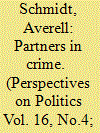

|
|
|
|
|
| Summary/Abstract |
In the years following the attacks of 9/11, the CIA adopted a program involving the capture, extraordinary rendition, secret detention, and harsh interrogation of suspected terrorists in the war on terror. As the details of this program have become public, a heated debate has ensued, focusing narrowly on whether or not this program “worked” by disrupting terror plots and saving American lives. By embracing such a narrow view of the program’s efficacy, this debate has failed to take into account the broader consequences of the CIA program. We move beyond current debates by evaluating the impact of the CIA program on the human rights practices of other states. We show that collaboration in the CIA program is associated with a worsening in the human rights practices of authoritarian countries. This finding illustrates how states learn from and influence one another through covert security cooperation and the importance of democratic institutions in mitigating the adverse consequences of the CIA program. This finding also underscores why a broad perspective is critical when assessing the consequences of counterterrorism policies.
|
|
|
|
|
|
|
|
|
|
|
|
|
|
|
|
| 14 |
ID:
162659
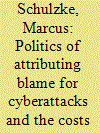

|
|
|
|
|
| Summary/Abstract |
Attribution is one of the most serious challenges associated with cyberattacks. It is often difficult to determine who launched an attack and why, which hinders efforts to formulate appropriate responses. Although the attribution problem has been discussed extensively in research on cybersecurity, it is generally approached as a technical challenge for security professionals and politicians. I contend that it is vital to take the attribution problem beyond this elite focus by considering how attributional challenges can interfere with the public’s efforts to understand security challenges and evaluate government actions. Faced with uncertainty and the confusion of attempting to understand novel cyber threats, citizens frequently lack the information they need to reliably identify the culprits behind attacks—or sometimes even to know whether an attack has taken place. I show that attributional uncertainty immediately following cyberattacks encourages dependence on a narrow range of elite frames and the assignment of blame to familiar enemies. Over time this promotes conspiratorial thinking and poses a risk to democratic accountability. When seen in light of these broader costs, the attribution problem becomes a vital political concern with implications that reach beyond the scope of elite-focused cybersecurity research.
|
|
|
|
|
|
|
|
|
|
|
|
|
|
|
|
| 15 |
ID:
162658
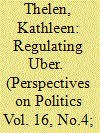

|
|
|
|
|
| Summary/Abstract |
I use the case of the transportation network company Uber as a lens to explore the comparative politics of the platform economy in Europe and the United States. Within the advanced capitalist world, different countries have responded in very different ways to this new service, from welcome embrace and accommodating regulatory adjustments to complete rejection and legal bans. I analyze Uber’s arrival and reception in the United States, Germany, and Sweden, documenting three very different responses to this disruptive new actor. I show that conflicts over Uber centered on different issues in the three countries. These differences were consequential because the specific regulatory “flashpoints”that Uber provoked mobilized different actors, inspired the formation of different coalitions, and shaped the terms on which conflicts over Uber were framed and fought.
|
|
|
|
|
|
|
|
|
|
|
|
|
|
|
|
| 16 |
ID:
162664


|
|
|
| 17 |
ID:
162667


|
|
|
|
|
|
|
|